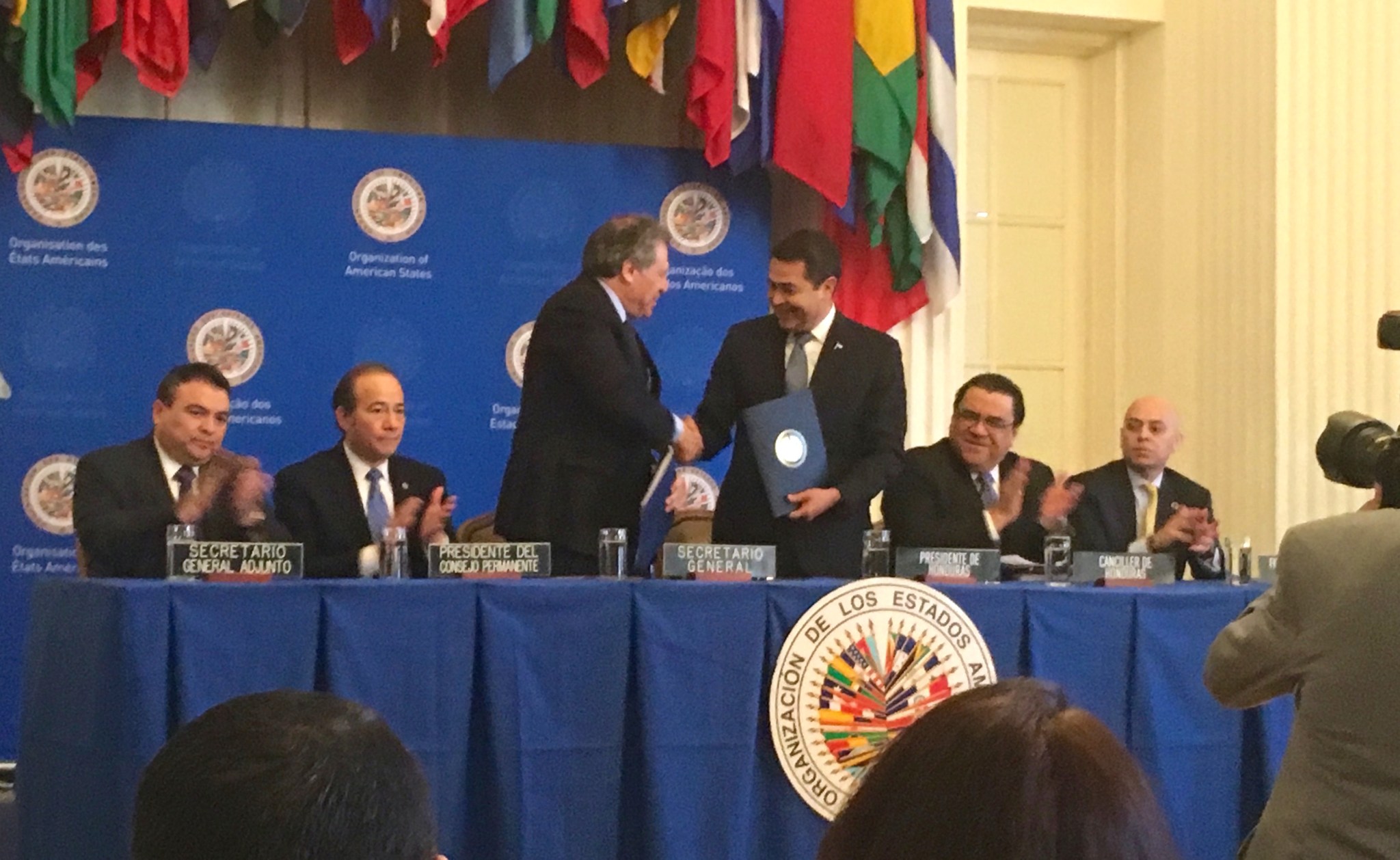
January 19, Honduran President Juan Orlando Hernández signed an agreement with the Organization of American States (OAS) to support a body to investigate politicians, judges and members of the security forces in matters of corruption and impunity.
Similar to the United Nations-backed entity in Guatemala (CICIG) that recently helped bring indictments against a sitting president and vice president, the Mission to Support the Fight against Corruption and Impunity in Honduras (MACCIH) is intended to do what weak prosecutors and judges have not been able to do—root out corruption in public institutions infected by organized crime. Whether it will have teeth depends on the support of both ordinary citizens and political elites.
Recently, Honduras seemed to hit a low. It is one of the poorest countries in Latin America with an average gross national income of about $2,300 per year. During the past 15 years, violent crime has increased to the point that it had the highest murder rate in the world for three years running, according to United Nations Office on Drugs and Crime statistics. The countryside had become riddled with clandestine airfields used by international drug traffickers. Succeeding administrations reorganized the nation’s security forces over and over again to weed out bad management and criminal elements, and will no doubt do so again. Last fall, the government charged members of one of the country’s most prominent families with tax evasion, after which the United States indicted them for laundering drug money. Even the agreement to establish the MACCIH follows controversy in which President Hernández admitted that his electoral campaign benefitted from some $300 million missing from the country’s social security institute, although he denies wrong-doing.
Last year, consultations among the OAS, the Honduran government, and civil society stakeholders produced a weak proposal that, in various iterations, would create an international body to provide advice, but not participate in prosecutions. Still, it had some positive aspects. Chile’s respected Justice Studies Center of the Americas would provide recommendations on reform. A follow-up mechanism would help Honduras live up to the Inter-American Convention Against Corruption. A public security study unit would monitor citizen security reports. And a civil society observatory would track progress on corruption cases.
The document that President Hernández ended up signing was stronger. The MACCIH will have access to documents and archives, as well as powers to investigate. The OAS Secretary General designates the chief of mission (slated to be Peru’s former prime minister Juan Jiménez), who will answer to the Organization’s Secretary of Political Affairs. The international judges and experts working for the MACCIH will be chosen by the Mission itself, and they, in turn, will select and certify a group of Honduran prosecutors and judges to take charge of investigating and prosecuting significant cases of corruption.
A possible downside is talk of a modest budget of $2 million per year. By comparison, Guatemala’s CICIG (International Commission Against Impunity in Guatemala) receives about $12 million per year. Hanging in the balance is $750 million in U.S. assistance to the Northern Triangle countries of Guatemala, El Salvador, and Honduras to improve citizen security, spur economic development, and reduce migratory pressures.
In principle, democracies shouldn’t need outside intervention to keep their justice systems on the straight and narrow. But if they embrace it willingly to weather a storm, then a helping hand makes sense. Other jurisdictions with more profound corruption troubles such as certain Mexican states, Nicaragua, and Venezuela (last on the World Justice Project’s Rule of Law Index) might take heed.
Honduras won’t achieve success overnight. Guatemala enthusiastically embraced CICIG in 2006 and saw results only incrementally. Moreover, CICIG seemed on the verge of extinction periodically at mandate renewal time. Fortunately, MACCIH has the backing of OAS Secretary General Luis Almagro—so far, an outspoken defender of democracy and human rights. Even with that, ordinary Hondurans will need to become better informed and develop new expectations of their justice system. And the country’s political class will have to decide what kind of future they will pursue—hopefully one that offers rule of law, prosperity, and opportunity for all its citizens. Only then will the MACCIH have moxie—in other words, guts.
Top